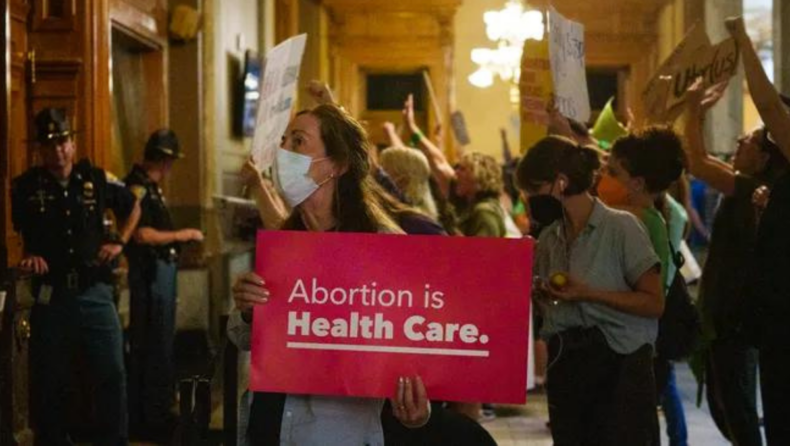Nearly a month after the Supreme court overturned the Roe vs Wade judgement, Indiana became the first state to ban nearly all abortions.
On Friday, the Republican state governor of Indiana, Eric Holcomb, signed the abortion bill into law. This decision comes more than a month after the Roe vs Wade decision.
Indiana and its new abortion ban
Before this ban came through, Indiana was one of the first states to discuss the possibility of a near-total ban. The Republican-run state is also the first to pass the bill through both chambers of the house.

The ban, which passed with a margin of 28-19, has a few exceptions. In cases of rape, incest, fetal abnormality, or if the life of the mother is in jeopardy. In cases where the pregnancy is a result of rape or incest, abortion is legal up to 10 weeks post-fertilization. However, after 10 months, not even the victims can get abortions. Further, the victims will not need to sign a notarized affidavit, to prove an attack. “Ultimately, those voices shaped and informed the final contents of the legislation and its carefully negotiated exceptions to address some of the unthinkable circumstances a woman or unborn child might face.”, said Republican Governor Eric Holcomb.
Only the hospitals can now perform abortions, naturally, all the abortion clinics will lose their licensees. Doctors performing said illegal abortions will also face legal actions apart from losing their medical license. Doctors who fail to report illegal abortions may also lose their medical licenses.
The bill had divided the Republicans while inciting protest from the Democrats. Some Republicans were hesitant because the exceptions were limited while others suggested that the measure was too restrictive. “If this isn’t a government issue — protecting life — I don’t know what is,” said a Republican. He added: “I know the exceptions are not enough for some and too much for others, but it’s a good balance.” On the other hand, Republican John Jacob said that the bill was not strong enough.

The ban will come into effect from September 15. Holcomb said in a statement that he was “most proud of each Hoosier who came forward to courageously share their views in a debate that is unlikely to cease any time soon. For my part as your governor, I will continue to keep an open ear.” While from the protestors’ side, White House press secretary Karine Jean-Pierre said that the Indiana legislature “took a devastating step” to “eliminate women’s constitutionally-protected right to abortion.”
As of now, the state of Indiana allows termination of pregnancy up to 22 weeks.
Other developments
The debates surrounding revolved around the case of a 10-year who had to travel from Indiana to Ohio to get an abortion.
The ban has also brought with it protestors from both sides. Pro-choice activists were present outside the chambers with signs such as “build the wall” (wall between the state and the church). Many democrats wore blazers with statements like “bans off our bodies”. Democrat Maureen Bauer spoke about the opposition surrounding the bill and highlighted the women “who are demanding that we are seen as equal”
On the other hand, pro-life activists often emphasized the religious sentiment surrounding the bill. They were a regular presence while the bill was still under scrutiny chanting words like “let us vote” and “church and the state”

Read more: Kansas first state to vote on abortion since Roe vs Wade’s overturn.













